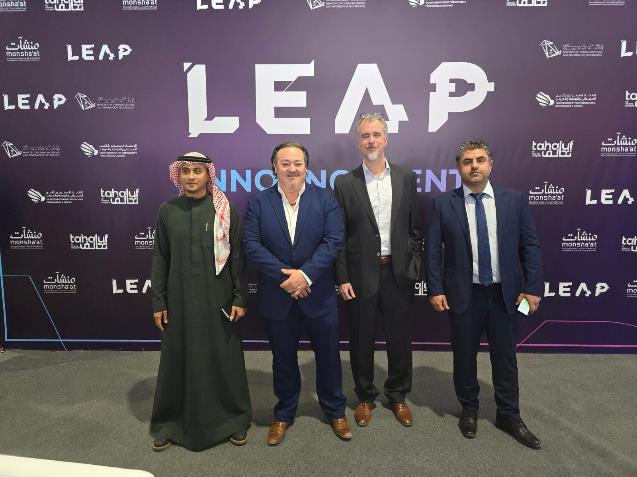SEALSQ Corp. today announced a significant initiative to establish an Open Semiconductors Assembly and Test (OSAT) Center in Saudi Arabia, at LEAP, the world’s premier technology event, which will take place from March 4-7 at the Riyadh Exhibition and Convention Center in the capital’s Malham district, in Saudi Arabia. LEAP, celebrated as Saudi Arabia’s “Digital Davos,” has attracted over 172,000 participants, and is highlighting Generative AI (GAI) and its transformative impact on industries globally, with a keen focus on developments in Saudi Arabia.

OSAT is designed to offer a comprehensive array of testing services, including wafer and final tests, as well as assembly services for various semiconductor packages such as QFN, BGA, WLCSP, and others. This initiative is a key component of a larger strategy aimed at developing Semiconductor Personalization Centers through Public-Private Partnerships (PPP). SEALSQ is currently in active discussions to launch three major projects across Europe, the Middle East, and the Far East. These OSAT centers will employ RISC-V technology for chip design, focusing on local manufacturing to meet the highest standards of security and certification from authoritative bodies like Common Criteria and NIST.
Notably, this Saudi Arabia-based OSAT initiative is part of SEALSQ’s dedication to advancing semiconductor technology by integrating quantum-resistant cryptographic capabilities to combat the looming threats posed by quantum computing. This involves embedding post-quantum cryptographic algorithms directly within the semiconductor architecture and offering robust protection against both present and future cryptographic challenges. Moreover, the incorporation of AI into this new generation of semiconductors is expected not only to enhance performance but also to introduce adaptive, intelligent security and efficiency protocols directly into the hardware. This paves the way for semiconductors that are quantum-resistant, self-optimizing, and capable of adapting to emerging threats and operational demands.
The fact that SEALSQ is a spin-off of WISeKey International Holding Ltd. (“WISeKey”) (SIX: WIHN, NASDAQ: WKEY), a renowned player in the field of cybersecurity and IoT, further solidifies this Saudi Arabia initiative. WISeKey has already established a foothold in the Saudi market through a joint venture with E.A. Juffali & Brothers (“Juffali Group”, a prominent local company. This partnership aims to leverage WISeKey’s expertise in cybersecurity and digital identity solutions to enhance the security features of the semiconductors developed at the OSAT center. By combining SEALSQ’s innovative semiconductor technologies with WISeKey’s cutting-edge cybersecurity solutions, the venture is set to usher in a new era of semiconductor technology that addresses the critical need for secure and efficient digital systems in the age of quantum computing and beyond.
This convergence of SEALSQ’s semiconductors, post-quantum cryptography, and AI, bolstered by the strategic collaboration with WISeKey and Juffali Group, heralds a transformative shift in semiconductor technology. It emphasizes the essential need for heightened security measures in the quantum computing era while capitalizing on the adaptive capabilities of AI. This collaboration aims to produce semiconductors that are not only extraordinarily secure but also supremely efficient, marking a significant milestone in the industry’s evolution.
In an era defined by digital transformation and technological innovation, Saudi Arabia is positioning itself as a pivotal player in the global semiconductor industry. The Kingdom’s ambitious Vision 2030 plan not only aims to diversify its economy beyond oil but also to harness the power of semiconductors to fuel its future growth, sustainability, and technological sovereignty. At the heart of Saudi Arabia’s economic strategy is a push towards diversification. Semiconductors, the tiny chips that power everything from smartphones to satellites, are critical to this vision. As the Kingdom invests in technology, manufacturing, and renewable energy sectors, the demand for these microelectronic marvels is skyrocketing.
Saudi Arabia’s commitment to building smart cities, epitomized by the ambitious NEOM project, underscores the crucial role of semiconductors. These futuristic urban developments aim to integrate IoT, AI, robotics, and autonomous vehicles into daily life, all of which rely heavily on semiconductor technology for their operation.
The Kingdom’s pivot towards renewable energy sources like solar and wind also highlights the growing need for semiconductors. These materials are essential for solar panels, power inverters, and energy storage systems, aligning with Saudi Arabia’s goal to create a more sustainable energy landscape.
The semiconductor revolution extends into healthcare and automotive manufacturing as well. With the healthcare sector embracing diagnostic equipment, wearable devices, and telemedicine, semiconductors stand as the backbone of innovation. Similarly, as the automotive industry shifts towards electric vehicles, the demand for sophisticated semiconductor technology is expected to grow exponentially.
Central to Saudi Arabia’s vision is the development of a knowledge-based economy, necessitating significant investments in STEM education and research. By fostering a new generation of engineers and scientists with expertise in semiconductor technology, the Kingdom aims to build a robust talent pipeline to fuel its technological ambitions.
As Saudi Arabia strides confidently towards its Vision 2030 objectives, the semiconductor industry emerges as a critical pillar of its economic and technological strategy. By leveraging the transformative power of these tiny chips, the Kingdom is not just preparing to meet the demands of the future—it’s positioning itself to shape it. With strategic investments, partnerships, and an unwavering commitment to innovation, Saudi Arabia is on a path to becoming a global powerhouse in the semiconductor realm, powering everything from its smart cities to its security systems with the technology of tomorrow.